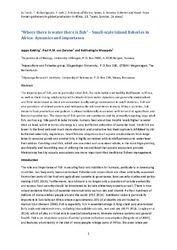| dc.description.abstract | The importance of fish, and in particular small fish, for sustainable and healthy livelihoods in Africa, as well as their strong relationship with climate driven water dynamics are generally undervalued and little understood as most are consumed locally and go unrecorded in catch statistics. Fish are vital providers of animal protein and indispensable micronutrients in many African societies, but modern food production and policies is almost unilaterally associated with terrestrial agriculture and livestock production. The majority of fish species are carnivores and by primarily targeting large adult fish, such as e.g. Nile perch in Lake Victoria, humans feed about two trophic levels higher in water than on land, which in terms of energy is a very inefficient utilization of available food. Small fish are lower in the food web and much more abundant and productive but their capture is inhibited by old fashioned selectivity regulations. Small fish are ubiquitous in all aquatic environments from large lakes to seasonal ponds and productivity is highly correlated with rainfall patterns and water level fluctuations. Catching small fish, which are sun-dried and consumed whole, is the most high-yielding, eco-friendly and nourishing way of utilizing the natural food that aquatic ecosystem provide. Maintaining healthy aquatic ecosystems are more important than traditional fishery management. | en_US |

